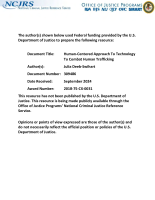Intelligence analysis
Using Intelligence Analysis to Understand and Address Fentanyl Distribution Networks in America’s Largest Port City
Online Localization and Prediction of Actions and Interactions
Face Search at Scale
Understanding Forensic Intelligence: The NIJ Framework
The Bayes Decision Rule Induced Similarity Measures
Clarification of Assumptions in the Relationship Between the Bayes Decision Rule and the Whitened Cosine Similarity Measure
Discriminative Face Alignment
Drug Overdose Evidence: How Intelligence Collection and Analysis of Drug Overdoses Can Improve Drug Investigations and Lead to Major Drug Traffickers
Protective Intelligence and Threat Assessment Investigations: A Guide for State and Local Law Enforcement Officials
Latent Fingerprint Matching
Generative Zero-Shot Learning via Low-Rank Embedded Semantic Dictionary
Multilevel Evaluation of Project Safe Neighborhoods
Project Safe Neighborhoods (PSN) is a DOJ-sponsored initiative to reduce violent crime, particularly gun crime, by fostering cooperation by criminal justice agencies and local partners to develop and implement strategic approaches.
See the YouTube Terms of Service and Google Privacy Policy
A Unique Approach to a Crime Gun Intelligence Center with the Inclusion and Support of 3D Virtual Comparison Technologies
Improving the Collection of Digital Evidence
Expanding Research to Examine the Impacts of Forensic Science on the Criminal Justice System
In 2004, the National Institute of Justice created the social science research on forensic sciences (SSRFS) research program to explore the impact of forensic sciences on the criminal justice system and the administration of justice. Much of the early research from the SSRFS program focused on DNA processing and the use of DNA in investigations and prosecutions.
See the YouTube Terms of Service and Google Privacy Policy




